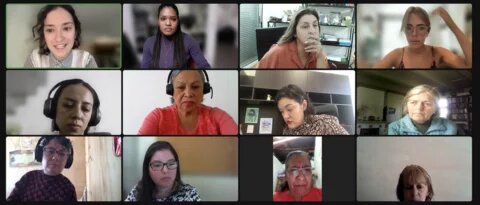On February 28, 2023, the EU-LAC Foundation, the Global Alliance for Care, the National Institute of Women of Mexico (INMUJERES), UN Women for the Americas and the Caribbean, the Economic Commission for Latin America and the Caribbean (ECLAC) and the Office of the United Nations High Commissioner for Human Rights (OHCHR) successfully held the dialogue "The inclusion of persons with disabilities in comprehensive care systems with a gender perspective: good practices and challenges in the EU and LAC". This event represented the second in a series of interregional dialogues promoted by the EU-LAC Women's International Network on the challenges and opportunities for the construction of comprehensive care systems in the European Union and Latin America and the Caribbean. Around 100 people from both regions attended the virtual event.
The event was inaugurated by Raquel Coello-Cremades, UN Women Regional Economic Empowerment Policy Specialist for Latin America and the Caribbean, who highlighted the relevance of perceiving persons with disabilities and their families as subjects with rights and not objects of protection. She also stressed the importance of promoting inter-institutional coordination to achieve the integration of multiple care systems and take advantage of the regional commitments made in the EU and LAC through the European Care Strategy and the Buenos Aires Commitment, respectively, to promote an inclusive care agenda.
Facundo Chávez Penillas, Advisor on the Rights of Persons with Disabilities at OHCHR, then presented an overview of studies and good practices on care policies for the inclusion of persons with disabilities. In this regard, he indicated the need to change the paradigm to recognize the active role of persons with disabilities in the management of their own support.
The main panel, moderated by Valentina Zendejas, Technical Secretary of the Global Alliance for Care, was made up of women leaders and representatives of civil society organizations, academia and public institutions in LAC and the EU. Antonia Irazábal, Head of Regulation of the Disability Division of the Ministry of Social Development of Uruguay; Carlos Ríos Espinosa, Associate Director of the Disability Rights Division of Human Rights Watch; Inge Volleberg, Researcher and Coordinator at Inclusion Europe; and Olga Montúfar, President of the Network of Indigenous and Afro-descendant Women with Disabilities of Latin America and the Caribbean shared their perspectives on the differentiated challenges faced by persons with disabilities as caregivers and care receivers and the implications of gender and other intersections such as belonging to an indigenous people on these challenges.
The proposals put forward by the panelists focused on guaranteeing the agency and autonomy of persons with disabilities; ensuring the right to receive, the right to not receive and to provide care; building policies with their voice and perspective; ending their segregation and institutionalization; and the creation of specific care models that guarantee physical and cognitive accessibility. In addition, they emphasized building a new concept of care to overcome the stigma, infantilization and medicalization that persons with disabilities, especially women and girls, have traditionally experienced.
The panel with the experts was followed by an interactive dialogue with those attending the event moderated by Natalia Bubulina Moreno, Specialist in the Management Group for the Inclusion of Persons with Disabilities of the Vice-Presidency of Colombia. During the dialogue, an interactive tool was enabled to collect the opinions and perspectives of many of the attendees. The dialogue revolved around two guiding questions: How could care systems contribute to deinstitutionalization processes and gender equality? How to promote the effective inclusion of people with disabilities in comprehensive care systems? The need to move from a concept of dependence to interdependence; to guarantee co-responsibility in care systems; to redistribute the budget that was previously destined to institutionalization and to guarantee the legal capacity of people with disabilities were some of the main conclusions.
The President of the EU-LAC Foundation, Leire Pajín, closed the second dialogue with some reflections on the importance of seeing care as a human right, a pillar of social protection, a global public good and a remunerated and recognized job. The State must be the guarantor, in this sense, of the rights of persons who need care, as well as of those who provide care services. Care systems need to contemplate persons with disabilities with full autonomy both in their role as recipients of care and as caregivers, particularly in the case of women and girls. She also invited the participants to keep working through the EU-LAC Women’s International Network for the development of inclusive public policies and exchange of experiences.
